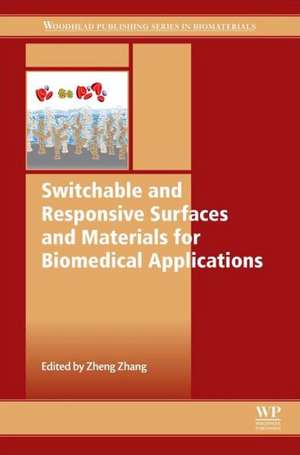Switchable and Responsive Surfaces and Materials for Biomedical Applications: Woodhead Publishing Series in Biomaterials
Editat de Johnathan Zhangen Limba Engleză Hardback – 11 ian 2015
Part one provides a detailed overview of switchable and responsive materials and surfaces, exploring thermo-responsive polymers, environmentally responsive polyelectrolytes and zwitterionic polymers, as well as peptide-based and photonic sensitive switchable materials. Further chapters include a detailed overview of the preparation and analysis of switchable polymer brushes and copolymers for biomedical application. Part two explores the biological interactions and biomedical applications of switchable surfaces, where expert analysis is provided on the interaction of switchable surfaces with proteins and cells. The interaction of stimuli-sensitive polymers for tissue engineering and drug delivery with biosurfaces is critiqued, whilst the editor provides a skillful study into the application of responsive polymers in implantable medical devices and biosensors.
- A comprehensive overview of switchable and responsive materials and surfaces
- Includes in depth analysis of thermo-responsive polymers, photonic sensitive materials and peptide-based surfaces
- Detailed exploration of biological interactions of responsive and switchable surfaces, covering stimuli-sensitive polymers for drug delivery, surfaces with proteins/cells and application of polymers in medical devices
Din seria Woodhead Publishing Series in Biomaterials
- 5%
 Preț: 1209.61 lei
Preț: 1209.61 lei - 9%
 Preț: 1288.81 lei
Preț: 1288.81 lei - 20%
 Preț: 1116.12 lei
Preț: 1116.12 lei - 36%
 Preț: 1030.16 lei
Preț: 1030.16 lei - 5%
 Preț: 1403.92 lei
Preț: 1403.92 lei - 26%
 Preț: 990.05 lei
Preț: 990.05 lei - 5%
 Preț: 1047.40 lei
Preț: 1047.40 lei - 5%
 Preț: 1097.68 lei
Preț: 1097.68 lei - 36%
 Preț: 847.30 lei
Preț: 847.30 lei - 9%
 Preț: 1159.07 lei
Preț: 1159.07 lei - 5%
 Preț: 1341.04 lei
Preț: 1341.04 lei - 5%
 Preț: 1116.94 lei
Preț: 1116.94 lei - 5%
 Preț: 1115.67 lei
Preț: 1115.67 lei - 20%
 Preț: 901.66 lei
Preț: 901.66 lei - 5%
 Preț: 1114.31 lei
Preț: 1114.31 lei - 26%
 Preț: 903.89 lei
Preț: 903.89 lei - 36%
 Preț: 939.94 lei
Preț: 939.94 lei - 5%
 Preț: 1511.72 lei
Preț: 1511.72 lei - 5%
 Preț: 1071.15 lei
Preț: 1071.15 lei - 9%
 Preț: 1090.57 lei
Preț: 1090.57 lei - 9%
 Preț: 1044.12 lei
Preț: 1044.12 lei - 29%
 Preț: 847.49 lei
Preț: 847.49 lei - 9%
 Preț: 1003.98 lei
Preț: 1003.98 lei - 5%
 Preț: 1050.99 lei
Preț: 1050.99 lei - 5%
 Preț: 1600.80 lei
Preț: 1600.80 lei - 5%
 Preț: 986.00 lei
Preț: 986.00 lei - 5%
 Preț: 1118.83 lei
Preț: 1118.83 lei - 5%
 Preț: 1050.99 lei
Preț: 1050.99 lei - 20%
 Preț: 1038.08 lei
Preț: 1038.08 lei - 5%
 Preț: 902.90 lei
Preț: 902.90 lei - 9%
 Preț: 1070.42 lei
Preț: 1070.42 lei - 5%
 Preț: 1512.75 lei
Preț: 1512.75 lei - 29%
 Preț: 1282.87 lei
Preț: 1282.87 lei - 25%
 Preț: 1121.07 lei
Preț: 1121.07 lei - 5%
 Preț: 1253.32 lei
Preț: 1253.32 lei - 9%
 Preț: 1204.85 lei
Preț: 1204.85 lei - 26%
 Preț: 1046.86 lei
Preț: 1046.86 lei - 5%
 Preț: 835.44 lei
Preț: 835.44 lei - 5%
 Preț: 838.79 lei
Preț: 838.79 lei - 5%
 Preț: 940.93 lei
Preț: 940.93 lei - 20%
 Preț: 1290.67 lei
Preț: 1290.67 lei - 5%
 Preț: 940.63 lei
Preț: 940.63 lei - 5%
 Preț: 1115.22 lei
Preț: 1115.22 lei - 20%
 Preț: 1598.75 lei
Preț: 1598.75 lei - 20%
 Preț: 964.40 lei
Preț: 964.40 lei - 20%
 Preț: 903.00 lei
Preț: 903.00 lei - 5%
 Preț: 1333.41 lei
Preț: 1333.41 lei
Preț: 989.25 lei
Preț vechi: 1041.32 lei
-5% Nou
Puncte Express: 1484
Preț estimativ în valută:
189.35€ • 205.75$ • 159.16£
189.35€ • 205.75$ • 159.16£
Carte tipărită la comandă
Livrare economică 14-28 aprilie
Preluare comenzi: 021 569.72.76
Specificații
ISBN-13: 9780857097132
ISBN-10: 085709713X
Pagini: 324
Dimensiuni: 152 x 229 x 20 mm
Greutate: 0.64 kg
Editura: ELSEVIER SCIENCE
Seria Woodhead Publishing Series in Biomaterials
ISBN-10: 085709713X
Pagini: 324
Dimensiuni: 152 x 229 x 20 mm
Greutate: 0.64 kg
Editura: ELSEVIER SCIENCE
Seria Woodhead Publishing Series in Biomaterials
Public țintă
Researchers and developers in industry and academia who are concerned with surface science of biomaterials, as well as biomaterials scientists who are focussing on biosensors, drug delivery and tissue engineeringCuprins
- Related titles
- List of contributors
- Woodhead Publishing Series in Biomaterials
- Introduction
- Part One. Switchable and responsive materials and surfaces
- 1. Thermo-responsive polymers: structure and design of smart materials
- 1.1. Introduction
- 1.2. Thermo-responsive polymers and their characteristics
- 1.3. Types of thermo-responsive polymers
- 1.4. Physical forms of switchable materials and their applications
- 1.5. Summary
- 2. Environmentally responsive polyelectrolytes and zwitterionic polymers
- 2.1. Introduction
- 2.2. Monomer subunits and polymerization approaches
- 2.3. General solution properties
- 2.4. Stimuli-induced changes and their applications
- 2.5. Future trends
- 2.6. Sources of further information
- 3. Peptide-based switchable and responsive surfaces
- 3.1. Introduction
- 3.2. Preparation of peptide surfaces
- 3.3. Responsive peptide surfaces
- 3.4. Peptides attached to responsive surfaces
- 3.5. Protein surfaces
- 3.6. Physical properties and characterisation
- 3.7. Emerging applications
- 3.8. Future trends
- 4. Photonic sensitive switchable materials
- 4.1. Introduction
- 4.2. Photonic sensitive switchable materials
- 4.3. Potential applications
- 4.4. Conclusions and future trends
- 5. Responsive polymer brushes for biomedical applications
- 5.1. Introduction
- 5.2. Brush architecture
- 5.3. Types of responsive polymer brushes
- 5.4. Biomedical applications
- 5.5. Summary and future trends
- 6. Preparation and analysis of switchable copolymers for biomedical application
- 6.1. Introduction
- 6.2. Switchable copolymer coatings
- 6.3. Advanced analytical techniques
- 6.4. Future trends
- 6.5. Sources of further information
- 1. Thermo-responsive polymers: structure and design of smart materials
- Part Two. Biological interactions and biomedical applications of switchable surfaces
- 7. Interaction of switchable biomaterials surfaces with proteins
- 7.1. Introduction
- 7.2. Protein adsorption on surfaces
- 7.3. Protein adsorption on thermo-responsive surfaces
- 7.4. Protein adsorption on pH and/or ionic strength-responsive surfaces
- 7.5. Protein adsorption on other responsive surfaces
- 7.6. Synergistic effect of surface chemistry and nanostructures on protein adsorption
- 7.7. Aspects for future research
- 8. Interaction of responsive/switchable surfaces with cells
- 8.1. Introduction
- 8.2. Controlling stem cell behavior
- 8.3. Interfacial properties
- 8.4. Physical behavior
- 8.5. Future trends
- 9. Temperature-responsive polymers for cell culture and tissue engineering applications
- 9.1. Introduction
- 9.2. Methods for preparing temperature-responsive cell culture surfaces (TRCSs) and their characteristics
- 9.3. Cell sheet-based regenerative medicine
- 9.4. Future application of temperature-responsive cell culture surface to support and promote regenerative medicine field
- 10. Stimuli-sensitive polymers for drug delivery and diagnostic systems interacting with biosurfaces
- 10.1. Introduction
- 10.2. Polymers sensitive to body’s internal stimuli
- 10.3. Polymers sensitive to the body’s external stimuli
- 10.4. Future trends
- 11. Application of responsive polymers in implantable medical devices and biosensors
- 11.1. Introduction
- 11.2. Biocompatibility of medical devices and responsive polymers
- 11.3. Cardiovascular devices
- 11.4. Drug delivery/infection control coatings and devices
- 11.5. Surgical devices
- 11.6. Dental and orthopedic devices
- 11.7. Ophthalmic devices
- 11.8. Respiratory devices
- 11.9. Gastrointestinal devices
- 11.10. Urogenital devices/urinary devices
- 11.11. Insulin delivery devices for diabetes management
- 11.12. Biosensors
- 11.13. Summary
- 7. Interaction of switchable biomaterials surfaces with proteins
- Index





